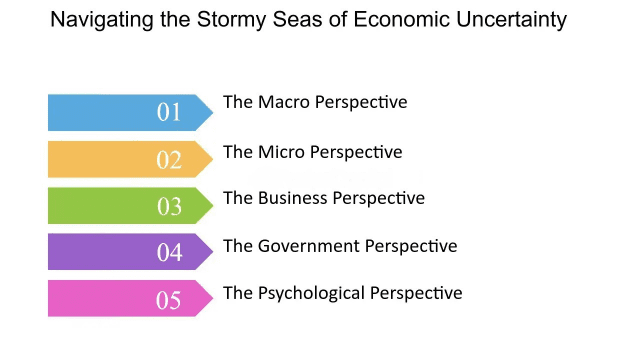The Economic uncertainty is a constant companion for businesses, lurking behind every corner and threatening to disrupt even the most well-laid plans. From global recessions to industry-specific disruptions, unpredictable situations can throw even the most robust organizations off balance. However, with careful planning and proactive measures, businesses can weather these storms and emerge more robust and resilient.
Critical Challenges in Times of Uncertainty:
Economic uncertainty manifests in different ways, presenting various challenges:
Fluctuating demand: Consumer spending habits can change drastically, impacting revenue streams and requiring rapid production and marketing strategy adjustments.
Supply chain disruptions: Geopolitical tensions, weather events, and resource shortages can lead to disruptions in the flow of goods, affecting production and raising costs.
Increased volatility in financial markets: Rising interest rates, currency fluctuations, and market downturns can make access to capital and financing more expensive and complex.
Decreased investor confidence: Economic ambiguity can lead to cautious investors, making fundraising and expansion plans more challenging.

Strategies for Success in Turbulent Times:
While the specific challenges may vary, several key strategies can help businesses navigate economic uncertainty:
Focus on cash flow: Prioritize cash preservation by carefully managing expenses, optimizing inventory levels, and collecting receivables promptly. Building a healthy cash reserve provides a buffer during lean times.
Diversify revenue streams: Don’t rely on a single product, service, or customer. Expand your offerings and target new markets to mitigate risks associated with specific sectors or demographics.
Invest in cost efficiency: Scrutinize operational costs and seek opportunities to streamline processes, automate tasks, and reduce wasteful spending. Every penny saved during uncertainty can become crucial later.
Embrace data-driven decision-making: Leverage data analytics to gain insights into evolving market trends, customer behaviour, and competitor strategies. Make well-informed decisions by relying on current knowledge as opposed to gut feeling.

Communicate transparently: Build trust and manage stakeholder expectations by regularly updating the company’s performance, challenges, and contingency plans. Open communication fosters confidence and collaboration during difficult times.
Develop contingency plans: Be proactive by anticipating potential scenarios and formulating plans for different economic situations. This preparedness minimizes disruption and enables a faster response to unforeseen events.
Invest in employee talent and morale: Your employees are your most valuable asset. Foster a culture of loyalty, trust, and open communication. Upskilling and reskilling initiatives can enhance their adaptability and value to the company.
Seek strategic partnerships: Collaboration with other businesses can provide access to new resources, markets, and expertise, strengthening your competitive advantage during challenging times.
Conclusion:
The future is inherently uncertain, and economic storms are inevitable. However, by recognizing the challenges, implementing proactive strategies, and fostering a culture of resilience, businesses can weather the storm and emerge more robust and adaptable. Remember, in a turbulent sea, it’s about surviving the waves and learning to navigate them skillfully.

